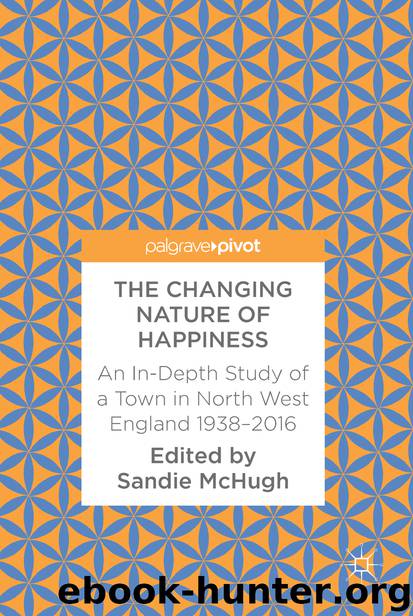The Changing Nature of Happiness by Sandie McHugh

Author:Sandie McHugh
Language: eng
Format: epub
Publisher: Springer International Publishing, Cham
The first place for Good Humour in 2014 (it was fourth in 1938) was not anticipated. Laughter can be an expression of happiness , of a positive emotional state, and can be taken as acceptance and positive interaction with others (Camazine et al. 2003). On the 2014 questionnaire, we explained the aspect as “more smiling and laughter for myself and those around me” seeming to confirm that this was the case. With higher living standards in 2014 and the safety net of the welfare state , it appears more good humour was seen as a higher priority in 2014 than in 1938.
The biggest movement in the two databases was that of Religion which moved from third to tenth. In 1938, more religion was in the top three Aspects of Happiness whereas in 2014, more religious influence in society was at the bottom. Had Bolton become less religious in the time between the databases?
In 1938, there were 204 churches and chapels , compared to 86 places of worship in 2014 for a population increase of fifty-eight percent. The decrease in religious venues itself reflects a decline in attendance and participation in services. This decline has not just been during the time lapse of our two databases. Voas and Crockett (2005) illustrate the gradual fall in national churchgoing since the 1851 census of religious worship. They also maintain a decline in religious belief. Many people may have a vague supposition that there is “something there”, but have a disinclination to spend time or effort in discovering or worshiping that “something”. During the 1930s decade, Gardiner (2010) maintains that Church authority became less important in people’s lives with some changes in social and moral attitudes, and that it was less able to provide a spiritual lead because of internal divisions. Mass Observation conducted an extensive survey of religion in Bolton , visiting and observing services in many of the 70 religious denominations, and in the background was a public debate about conflict, war and political ideologies. The Spanish Civil War was divisive with Bolton’s Roman Catholics collecting funds for the Nationalists and other church groups for the Republicans (Hall 2015).
Mass Observation (1943) also noted that the influence of religion, the pub and political parties were slowly declining as the cinema, radio and the Daily Mirror became more prominent. However, religion was an important part in the life of Worktown , with social events and general activities often centred on the church or chapel. The lay leaders in religious organizations were usually the same leaders in business, town council, police, politics and local press (Hall 2015). Religion can provide a moral and social framework to people’s lives in any period. Indeed, the 2011 census revealed that Bolton was more religious than the rest of Britain: about 17% stated they had no religion, compared to a national figure of 25%; 63% declared they were Christian, compared to 59%, and the number of Muslims at 11% and Hindus at 2% were higher than the national average (5% and 1.
Download
This site does not store any files on its server. We only index and link to content provided by other sites. Please contact the content providers to delete copyright contents if any and email us, we'll remove relevant links or contents immediately.
Rewire Your Anxious Brain by Catherine M. Pittman(18643)
Talking to Strangers by Malcolm Gladwell(13346)
The Art of Thinking Clearly by Rolf Dobelli(10451)
Mindhunter: Inside the FBI's Elite Serial Crime Unit by John E. Douglas & Mark Olshaker(9318)
Becoming Supernatural by Dr. Joe Dispenza(8199)
Change Your Questions, Change Your Life by Marilee Adams(7758)
Nudge - Improving Decisions about Health, Wealth, and Happiness by Thaler Sunstein(7690)
The Road Less Traveled by M. Scott Peck(7594)
The Lost Art of Listening by Michael P. Nichols(7490)
Mastermind: How to Think Like Sherlock Holmes by Maria Konnikova(7320)
Enlightenment Now: The Case for Reason, Science, Humanism, and Progress by Steven Pinker(7306)
Win Bigly by Scott Adams(7183)
The Way of Zen by Alan W. Watts(6600)
Daring Greatly by Brene Brown(6501)
Big Magic: Creative Living Beyond Fear by Elizabeth Gilbert(5754)
Grit by Angela Duckworth(5604)
Ego Is the Enemy by Ryan Holiday(5413)
Men In Love by Nancy Friday(5232)
The Laws of Human Nature by Robert Greene(5171)
